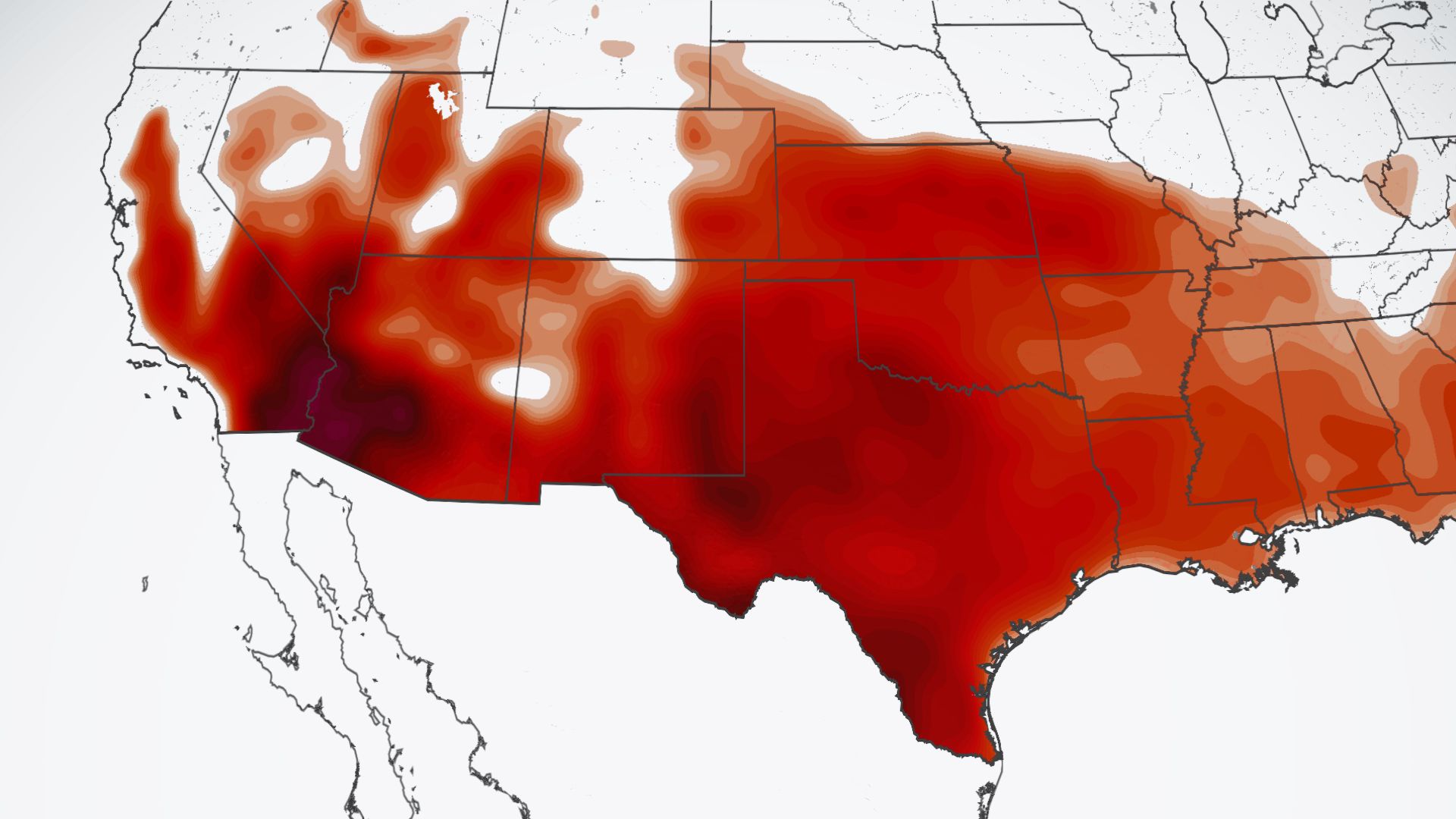
Excessive heat can be more than just uncomfortable; it can be downright dangerous. Heatwaves are becoming more frequent and intense, affecting millions worldwide. But what exactly qualifies as excessive heat? Excessive heat refers to prolonged periods of high temperatures, often combined with high humidity, that can pose serious health risks. Heat-related illnesses like heat exhaustion and heatstroke can strike anyone, but certain groups, such as the elderly and young children, are particularly vulnerable. Understanding the impact of excessive heat is crucial for staying safe during those scorching summer days. Let's dive into 50 facts about excessive heat to help you stay informed and prepared.
Understanding Excessive Heat
Excessive heat can be more than just uncomfortable; it can be dangerous. Let's explore some fascinating and crucial facts about extreme heat and its effects on our world.
-
Heatwaves are increasing in frequency and intensity due to climate change. Rising global temperatures contribute to more frequent and severe heatwaves.
-
Heatwaves can be deadly. In 2003, a heatwave in Europe caused over 70,000 deaths.
-
Urban areas are often hotter than rural areas. This phenomenon, known as the "urban heat island effect," occurs because buildings and roads absorb and retain heat.
-
High temperatures can affect infrastructure. Excessive heat can cause roads to buckle and train tracks to warp.
-
Heat can impact mental health. Studies show that extreme heat can increase anxiety, depression, and even violent behavior.
Health Impacts of Excessive Heat
Excessive heat doesn't just make you sweat; it can have serious health consequences. Here are some important facts about how heat affects our bodies.
-
Heat exhaustion is a common heat-related illness. Symptoms include heavy sweating, weakness, dizziness, and nausea.
-
Heatstroke is a severe condition that can be fatal. It occurs when the body temperature rises above 104°F (40°C) and requires immediate medical attention.
-
Dehydration is a major risk during heatwaves. High temperatures increase the body's need for water, and dehydration can lead to serious complications.
-
Certain medications can increase heat sensitivity. Drugs for high blood pressure, allergies, and mental health conditions can make it harder for the body to regulate temperature.
-
Children and the elderly are more vulnerable to heat. Their bodies are less efficient at regulating temperature, making them more susceptible to heat-related illnesses.
Environmental Effects of Excessive Heat
Excessive heat doesn't just affect humans; it has significant impacts on the environment as well. Here are some key facts about how heat affects our planet.
-
Heatwaves can lead to droughts. High temperatures increase evaporation rates, reducing water availability.
-
Wildfires are more likely during heatwaves. Dry conditions and high temperatures create the perfect environment for fires to start and spread.
-
Heat can harm wildlife. Animals may struggle to find water and food, and some species may not survive extreme temperatures.
-
Coral reefs are at risk from heat. High sea temperatures can cause coral bleaching, which damages these vital ecosystems.
-
Excessive heat can reduce crop yields. Many plants struggle to grow in extreme temperatures, leading to food shortages.
Coping with Excessive Heat
Knowing how to stay safe during extreme heat is crucial. Here are some practical tips and facts about coping with high temperatures.
-
Stay hydrated. Drink plenty of water, even if you don't feel thirsty.
-
Wear lightweight, light-colored clothing. This helps keep your body cool by reflecting sunlight.
-
Avoid strenuous activities during the hottest part of the day. Try to stay indoors between 10 a.m. and 4 p.m.
-
Use fans and air conditioning. These can help lower your body temperature and make you more comfortable.
-
Check on vulnerable individuals. Ensure that children, the elderly, and those with health conditions are staying cool and hydrated.
Historical Heatwaves
Throughout history, there have been some notable heatwaves that have had significant impacts. Here are a few historical facts about extreme heat events.
-
The 1936 North American heatwave was one of the deadliest. It caused over 5,000 deaths in the United States and Canada.
-
The 2010 Russian heatwave led to widespread wildfires. It resulted in around 56,000 deaths and significant economic losses.
-
In 2015, India experienced a severe heatwave. Temperatures reached up to 118°F (48°C), causing over 2,500 deaths.
-
The 2019 European heatwave broke temperature records. Paris recorded its highest temperature ever at 108.7°F (42.6°C).
-
The 2021 Pacific Northwest heatwave was unprecedented. Temperatures soared above 115°F (46°C) in some areas, causing numerous deaths and infrastructure damage.
The Science Behind Heatwaves
Understanding the science of heatwaves can help us better prepare for and mitigate their effects. Here are some scientific facts about excessive heat.
-
Heatwaves are defined by prolonged periods of excessively hot weather. They typically last for several days or weeks.
-
High-pressure systems often cause heatwaves. These systems trap warm air in an area, preventing it from dissipating.
-
Climate change is making heatwaves more common. As global temperatures rise, heatwaves are becoming more frequent and severe.
-
Urbanization contributes to the urban heat island effect. Cities are often several degrees warmer than surrounding rural areas due to human activities and infrastructure.
-
Heatwaves can exacerbate air pollution. High temperatures can increase the concentration of pollutants like ozone, which can harm human health.
Economic Impacts of Excessive Heat
Excessive heat can have significant economic consequences. Here are some facts about how heatwaves affect economies.
-
Heatwaves can reduce worker productivity. High temperatures can make it difficult to work, leading to decreased output.
-
Agricultural losses are common during heatwaves. Crops may fail, and livestock can suffer, leading to economic losses for farmers.
-
Energy demand spikes during heatwaves. Increased use of air conditioning and cooling systems can strain power grids and lead to blackouts.
-
Heatwaves can damage infrastructure. Roads, railways, and buildings can all be affected by extreme heat, leading to costly repairs.
-
Tourism can be impacted by heatwaves. High temperatures may deter tourists, leading to economic losses for destinations that rely on tourism.
Preparing for Future Heatwaves
As heatwaves become more common, it's important to be prepared. Here are some facts about how we can better prepare for and mitigate the effects of excessive heat.
-
Early warning systems can save lives. These systems can alert people to impending heatwaves, allowing them to take precautions.
-
Green spaces can help cool urban areas. Parks, trees, and other vegetation can reduce the urban heat island effect.
-
Building design can mitigate heat. Features like reflective roofs and better insulation can help keep buildings cool.
-
Community programs can support vulnerable populations. Initiatives like cooling centers can provide relief for those without access to air conditioning.
-
Public education is key. Teaching people about the dangers of heatwaves and how to stay safe can reduce heat-related illnesses and deaths.
Fun Facts About Heat
While excessive heat can be dangerous, there are also some interesting and fun facts about heat and temperature. Here are a few to lighten the mood.
-
The hottest temperature ever recorded on Earth was 134°F (56.7°C). This occurred in Death Valley, California, in 1913.
-
The human body can produce a lot of heat. During intense exercise, the body can generate enough heat to boil a liter of water in 30 minutes.
-
Some animals have unique ways of dealing with heat. For example, camels can raise their body temperature to avoid sweating and conserve water.
-
Heat can affect the taste of food. High temperatures can enhance the flavors of certain foods, making them taste more intense.
-
The color of your clothes can impact how hot you feel. Dark colors absorb more heat, while light colors reflect it.
The Future of Heatwaves
As our planet continues to warm, heatwaves are expected to become more frequent and severe. Here are some facts about what the future might hold.
-
Climate models predict more frequent heatwaves. By the end of the century, some regions could experience heatwaves every year.
-
Heatwaves will likely last longer. Future heatwaves could persist for weeks or even months.
-
Extreme heat could become the norm. Some areas may experience temperatures that are currently considered extreme on a regular basis.
-
Adaptation will be crucial. Communities will need to adapt to rising temperatures to protect public health and infrastructure.
-
Global cooperation is needed. Addressing the root causes of climate change will require coordinated efforts from countries around the world.
Final Thoughts on Excessive Heat
Excessive heat isn't just uncomfortable; it can be downright dangerous. Knowing the signs of heat exhaustion and heatstroke can save lives. Staying hydrated, wearing light clothing, and avoiding strenuous activities during peak heat hours are simple yet effective ways to stay safe. Heatwaves are becoming more common due to climate change, making it crucial to stay informed and prepared. Remember, pets and elderly individuals are particularly vulnerable. Keep an eye on local weather reports and heed any heat advisories. By taking these precautions, you can enjoy the summer while minimizing the risks associated with excessive heat. Stay cool, stay safe, and make the most of the sunny days ahead.
Was this page helpful?
Our commitment to delivering trustworthy and engaging content is at the heart of what we do. Each fact on our site is contributed by real users like you, bringing a wealth of diverse insights and information. To ensure the highest standards of accuracy and reliability, our dedicated editors meticulously review each submission. This process guarantees that the facts we share are not only fascinating but also credible. Trust in our commitment to quality and authenticity as you explore and learn with us.


